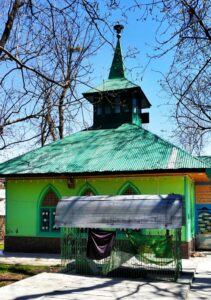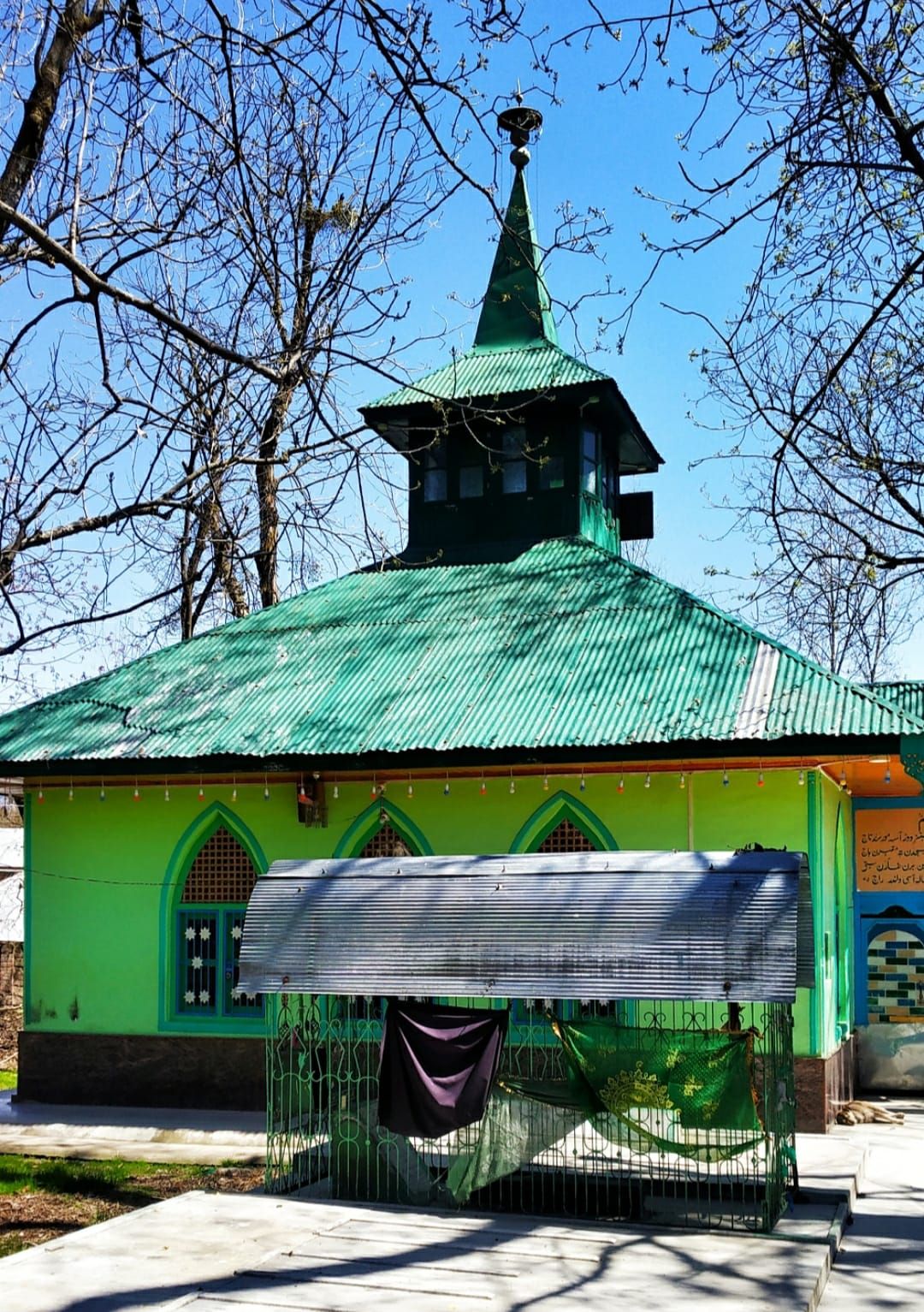The miracles and wonders associated with Qadir Saeb e Kral, whose altruistic deeds of compassion have etched an enduring legacy on Kashmiri society. From curing the afflicted to nourishing the needy, his message of love continues to reverberate.
Qadir Saeb e Kral’s shrine, located in the soothing village of Hirri within the scenic expanse of north Kashmir’s Kupwara district, stands as a testament to the enduring spirituality and communal harmony of the region. Revered by adherents of all faiths, this sufi sanctuary radiates an aura of serenity that captivates visitors.
Situated approximately 5-6 kilometers westward from the bustling town of Kupwara, the village of Hirri serves as the custodian of this sacred site. It is but one among the myriad of mystical enclaves scattered throughout the picturesque landscape of Kashmir. While some of these sanctuaries are well-known, many others, along with the narratives of their revered occupants, have faded into the annals of history.
As a student of history with a profound interest in documenting the rich tapestry of Kashmir’s sufi heritage, I embarked on a journey to explore Hirri village last month. Grateful acknowledgment is owed to Farooq Shaheen, a distinguished poet and the esteemed secretary of Adbi Markaz Kamraz (AMK), whose invaluable guidance and insights facilitated my research endeavors.
Drawing from oral traditions, it is discerned that Abdul Qadir Kumar, affectionately known as Qadir Saeb e Kral or “Kral bab” of Hirri, was a saint of remarkable spiritual stature. His luminous presence attracted a constellation of devotees from across the breadth and depth of Kashmir.
Hirri village, adorned with a plethora of historical relics, not only hosts the mausoleum of Qadir Saeb e Kral but also boasts the presence of a wooden mosque, a testament to the mystic’s architectural ingenuity. According to local lore, Qadir Saeb sought the assistance of Alama Anwar Shah Kashmiri in the construction of this sacred edifice. However, the ravages of time have taken their toll on this architectural gem, as wooden moths have rendered it fragile and in dire need of preservation.

Belonging to the illustrious Kral family, renowned for its lineage of sufi saints and poets such as Soch Kral, Qadir Saeb e Kral was born into a legacy steeped in reverence. It is believed that he entered the world in the year 1885, his father being the esteemed Karim Saeb e Kral. Early in life, he embraced matrimony and was blessed with two daughters, Az ded and Noor ded, as well as a son named Gafoor Saeb e Kral.
According to familial accounts, Qadir Saeb e Kral embarked on his spiritual odyssey under the tutelage of the revered sufi saint, Khair Saeb of Trehgam Kupwara. Under the sage guidance of his mentor, Qadir Saeb ascended to sublime spiritual heights, steadfastly adhering to the Suhrawardi silsila of sufism.
His austere existence was characterized by unwavering devotion to prayer and meditation, coupled with a steadfast commitment to ethical conduct. He exhorted his disciples to uphold the tenets of righteousness, emphasizing the importance of performing the five daily prayers and earning a livelihood through honest means.
Central to his teachings was the principle of universal love and brotherhood, wherein simplicity of living and compassion towards humanity served as pathways to divine proximity. Qadir Saeb e Kral’s philanthropic endeavors manifested in the establishment of a “langar” or free community kitchen, providing sustenance to the needy—a tradition that endures to this day.
Numerous miraculous occurrences, or “karamaats,” are attributed to this venerable mystic, transcending rational explanation. Among these anecdotes is the account of a childless couple who, upon seeking his intercession, were blessed with progeny. Another narrative recounts the miraculous recovery of an ailing individual, facilitated by a mere touch of Qadir Saeb’s blessed hand.
The veneration accorded to Qadir Saeb e Kral extends beyond the confines of his shrine, with neighboring villages attesting to his spiritual potency. His annual Urs, celebrated with fervent devotion on the 16th and 17th of June, serves as a rallying point for devotees from far and wide, who converge upon his hallowed precincts to offer prayers and supplications.
The legacy of Qadir Saeb e Kral, characterized by selflessness and piety, resonates as a beacon of spiritual enlightenment in an age marked by materialism and discord. As custodians of his memory, it behooves us to safeguard his shrine and perpetuate his teachings for generations to come.
The views expressed in this article are solely those of the author and do not necessarily reflect the opinions or views of this Magazine. The author can be reached at [email protected]
Blurb
Belonging to the illustrious Kral family, renowned for its lineage of sufi saints and poets such as Soch Kral, Qadir Saeb e Kral was born into a legacy steeped in reverence. It is believed that he entered the world in the year 1885, his father being the esteemed Karim Saeb e Kral.

Leave a Reply